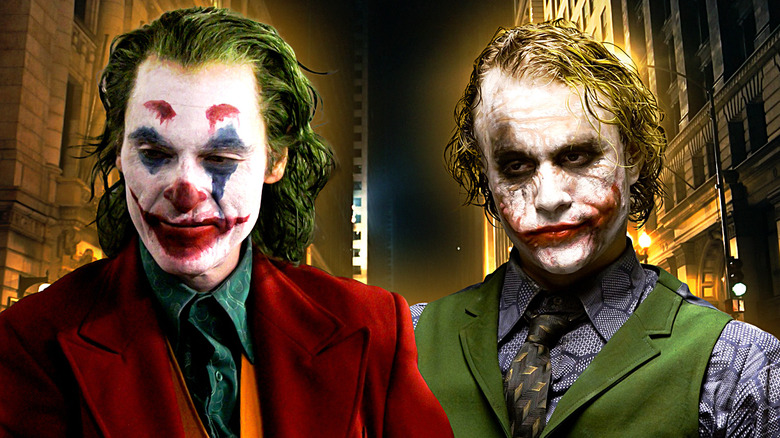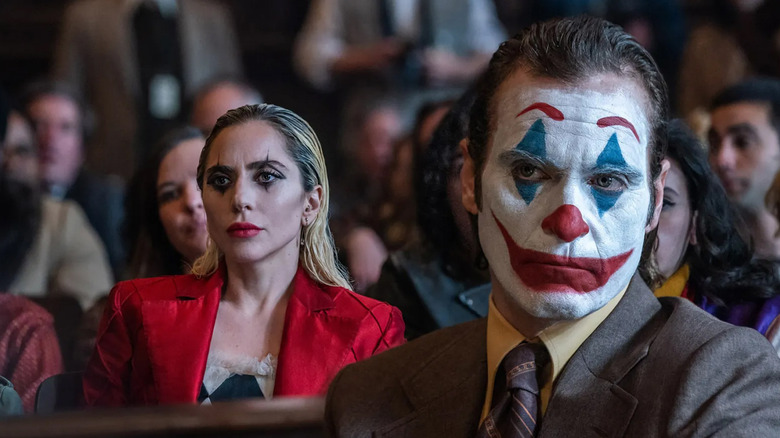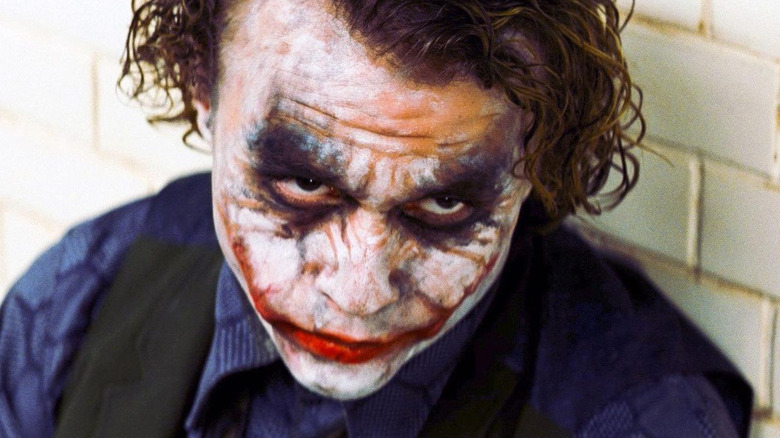Let's Bust The Most Ridiculous Fan Theory About Joker 2
Warning: This story contains major spoilers for "Joker: Folie à Deux," so proceed with caution.
Thanks to the long history of comic book characters, there are often many fan theories circulating about any given comic book movie, especially after the first trailer has been unveiled. Fans pick up on the most minute details, using them to fuel predictions about where the plot is headed or which characters are waiting in the wings to be revealed. Sometimes they're right on the money, thanks to a rich background of details to pull from Marvel, DC Comics, etc. But for every fan theory that's right, there are dozens that are just plain ridiculous and unnecessary. It should come as no surprise that "Joker: Folie à Deux" has inspired plenty of fan theories leading up to its release, but there's one fan theory that has only just emerged with the release of the movie. The shocking ending of Arthur Fleck's story has inspired a ludicrously assumed connection to a beloved Batman movie.
At the very end of "Joker: Folie à Deux," Arthur has been rejected by Lee (Lady Gaga). After he admits that Joker doesn't exist and that he committed the murders of the first movie of his own cognizance, Lee leaves the courtroom, and she's no longer interested in running away with Arthur. She tells him this when they reunite at the stairs in his old neighborhood where Arthur famously danced in the first film. Arthur is apprehended by the cops and sent back to jail.
With all the excitement of the trial done, Arthur is back to normal days in Arkham. But when he's told there's a visitor waiting for him, a random inmate stops to tell him a joke. It's a long lead-in to the inmate delivering the same "You get what you f***ing deserve" punchline from the first "Joker," before the inmate stabs Arthur in the gut roughly a dozen times, leaving him to bleed out and die on the floor. As the camera focuses on Arthur collapsing and dying, you can see the inmate laughing in the background and carving a smile into his face with the knife.
For some reason, some fans have taken this to signify that this inmate would go on to become Heath Ledger's version of Joker in "The Dark Knight." Not only is this completely unfounded and desperate to give some kind of meaning to a hollow ending that has zero substance, but the timeline simply doesn't match up with the events of "Joker," and it would ruin one of the best elements of Christopher Nolan's version of the villain.
Does Joker 2 have a Dark Knight tribute? Let's explain
Before we get to the ending of "Joker: Folie à Deux," let's talk about another piece of this "Dark Knight" puzzle. In the third act, there's a big explosion outside of the courtroom where Arthur's trial is taking place. It blasts a massive hole in the wall and sends debris everywhere. As Arthur slowly wakes up after being knocked out and makes his way out of the courtroom to escape, we see Harvey Dent (Harry Lawtey), still in shock after the blast but propped up against the wall between the lawyers and those attending the trial. The left side of his face is scratched up and bloodied, presumably leading to his inevitable turn to Two-Face that always happens to the character at some point in the Batman universe. If you want to interpret that as a tribute to "The Dark Knight," go ahead. But Harvey Dent always has his face damaged somehow, and this is merely an allusion to that character's presumed future.
Now, let's circle back around to the ending of "Joker: Folie à Deux." Many are assuming that because the "Young Inmate" character played by Connor Storie carves a smile into his face that he's intended to become Heath Ledger's Joker, who famously had prominent scars on his face. Furthermore, they're taking his actions to assume that this random inmate is who will actually become the real Joker, who was inspired by Arthur Fleck's actions to become the villain that Arthur never truly was. But that doesn't feel right either. First of all, as we just established, that moment with Harvey Dent above would seem to signify that the attorney has gained the very traits that will see him become Two-Face, which doesn't line up with "The Dark Knight" at all. Aside from that, there's a much better reason as to why this theory is silly.
Is Connor Storrie's 'Young Inmate' the real Joker?
"The Dark Knight" never actually revealed where Joker's scars came from, with the villain telling several different stories about their origins. To assume that this is the origin story of the Joker takes away one of the best traits of Heath Ledger's Joker. Not knowing where he got those scars is part of what makes him terrifying. Not knowing why he's creating anarchy in Gotham City is what makes him so threatening. The fact that he has a different story to tell about their origin, and we don't really know what's driving him, makes him that much more unhinged and unpredictable. To assume that he gave himself those scars after killing Arthur Fleck would be a disservice to Heath Ledger's magnificent version of Joker.
Furthermore, the logistics of the timeline don't even match up. "Joker" was confirmed to take place in 1981, and "Folie à Deux" takes place a year later. That means, by the time "The Dark Knight" rolls around in 2008, it's 27 years later. That young inmate at the end of the movie isn't a teen, and he looks like he's in his early twenties. So in "The Dark Knight," that means Joker would be almost 50 years old. Heath Ledger was 28 years old at that time. So this just doesn't make any sense at all.
If you want to assume that the carving of the scars into that young inmate's face is meant to be a tribute to Heath Ledger's Joker, you're free to do that. However, taking that assumption and following it to the conclusion that the character is actually Heath Ledger's Joker is just plain dumb. In fact, I wouldn't even go so far as to assume that this character becomes the real Joker in Todd Phillips' version of Gotham City. The ending is only meant to signify that there's always going to be a madman who takes on the mantle of someone like Joker. Perhaps the biggest joke in Todd Phillips' "Joker" movies is that there is no real Joker at all.


